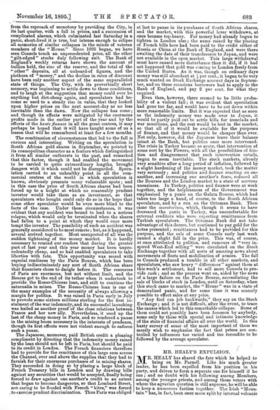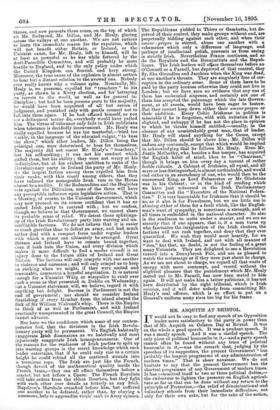MR. HEALY'S EXPULSION.
MR. HEALY has shared the fate which he helped to bring on Mr. Parnell. Like his much greater leader, he has been expelled from his position in his party, and driven to form a separate one for himself if he can ; and no doubt with his following among Members, among the younger priests, and among those voters with whom the agrarian question is still supreme, he will be able to keep a numerous faction together. The Irish "Moun- tain" has, in fact, been once more split by internal volcanic 'throes, and now presents three cones, on the top of which it Mr. Redmond, Mr. Dillon, and Mr. Healy, glaring across the valleys at one another. We are not curious to learn the immediate reason for the expulsion, which will not benefit either Britain, or Ireland, or the Unionist cause, for Mr. Healy, left to himself, will be at least as powerful as he was while fettered by the Anti-Parnellite Committee, and will probably be more hostile to England, and to the only policy under which the United Kingdom can flourish and keep strong. Moreover, the true cause of the explosion is almost certain to bear but a distant relation to the avowed one. Nobody ever really knows why a volcano spits. Nominally, Mr. Healy is, we presume, expelled for " treachery " to his party, as shown in a Kerry election, and for betraying its secrets to the world, as well as for general in- discipline ; but had he been persona grata to the majority, he would have been acquitted of all but errors of judgment, and punished only with gentle counsel not to fall into them again. If he had effaced himself, as you see a delinquent terrier do, everybody would have patted him. The virtue of tolerance only fails in Irish politicians when tolerance is decidedly inconvenient. Mr. Healy was really expelled because he was too masterful,—tried too visibly, in the language of the educated vulgar, "to boss the show," which other leaders, Mr. Dillon being the principal one, were determined to boss for themselves.
The majority did not resent Mr. Healy's "treachery," but his self-seeking ; it was not his conduct which galled them, but his ability ; they were not weary at his iudiscipline, but at his evident ambition to make of the -Revolutionary party in Ireland the party of Mr. Healy.
Sa the largest faction among them expelled him from their ranks, with this result among others, that they have reduced the manageable Irish vote in the House almost to a nullity. If the Redmondites and the Healyites cote against the Dillonites, none of the three will have any perceptible influence upon legislative action. That is a blessing, of course, to the Unionist Government, which may now proceed on its course confident that it has no united Irish party to contend with ; but we confess, though we believe in that Government, we cannot share its probable sense of relief. We detest these splittings- up of the Irish Revolutionary party into warring and un- intelligible factions. We do not believe that it is easier to crush guerillas than to defeat an army, and had much rather deal with a compact force under regular leaders 'with which a peace can ultimately be arranged. Great Britain and Ireland have to remain bound together, even if both hate the Union, and every division which makes it more difficult to find a modus vivendi is an injury done to the future alike of Ireland and Great Britain. The factions will only compete with one another in violence and unreason; and will only compel us to keep on striking when we might, if they were united and reasonable, commence a hopeful negotiation. It is natural ,2nough for a Unionist Whip or wirepuller to exult over ,uch a scene as that presented in Dublin on Wednesday ; but a Unionist statesman will, we believe regard it with .anything but delight. Success in Parliament is not the end of government; nor should we consider Ireland flourishing if every Member from the island obeyed the flick of Sir William Walrond's whip. There is the Empire to think of as well as Parliament, and with Ireland practically unrepresented in the great Council, the Empire cannot advance.
Nor have we the confidence which some of our contem- poraries feel, that the divisions in the Irish Revolu- tionary party will be permanent. We English habitually exaggerate Irish dissensions as we habitually and most injuriously exaggerate Irish homogeneousness. One of the reasons for the readiness of Irish parties to split up into warring groups is the secret knowledge which each leader entertains, that if he could only rise to a certain height he could rebind all the scattered strands into a tenacious rope. The Irish are just like the French, though devoid of the mathematical quality inside the French brain,—they can all efface themselves before a master, but not before a Cause. The French Royalists will take orders from the eldest Bourbon, but they fight 'with each other over details as bitterly as any Irish. Napoleon's Marshals crouched before him, but suffered one another to be defeated, rather than, by obeying a summons, help to aggrandise rivals' rank in Army opinion. The Republicans yielded to Thiers or Gambetta, but de- prived of their control, they make groups without end, are perpetually bidding against each other, and when their amour - propre is stirred, abuse one another with a vehemence which only a difference of language, and perhaps of intellectual polish, prevents us from seeing is strictly Irish. Nevertheless France continues, and so do the Royalists and the Bonapartists and the Repub- licans. The Irish leaders will eftace themselves before an O'Connell or a Parnell, but deprived of that control, they fly, like Girondins and Jacobins when the King was dead, at one another's throats. They are singularly free of cor- ruption in the ordinary sense. Some of them have to be paid by the party because otherwise they could not live in London ; but we have seen no evidence that any one of them has embezzled sixpence, and certainly not one of them has accepted the patronage which the late Govern- ment, at all events, would have been eager to bestow. But they cannot keep down either their amour-propre or their ambition. Every Celtic Irishman in politics is miserable if he is forgotten, wild with irritation if he is slighted, and unhappy if he has not the place in opinion to which he thinks himself entitled,—usually, in the absence of any unmistakably great man, that of leader. Mr. Healy will stand anything for the Cause, except that Mr. Dillon should be above him ; Mr. Dillon will endure any contumely, except that which would be implied in acknowledging that he follows Mr. Healy. Even Mr. Justin McCarthy, who, besides a fine temper, has acquired the English habit of mind, likes to be "Chairman," though it brings on him every day a torrent of rather feeble ridicule. A Cabinet of Irishmen, all equal, and all more or less distinguished, is almost unthinkable, and would end either in an ascendency of one, who would then be the uncrowned King, as Lord Palmerston or Mr. Gladstone was in his Cabinet; or in the kind of rending which we have just witnessed in the Irish Parliamentary Committee and the "Executive of the National Federa- tion." It is very lamentable for Irishmen that it should be so, as it also is for Frenchmen, but we see little use in abusing either of them for a fault which, like the English- man's want of sympathy, is sometimes a strength, and at all times is embedded in the national character. So also is the readiness to unite under a master, and we see no security that if one appears, that is, if a man tarns up who fascinates the imagination of the Irish electors, the factions will not rush together, and deny that they ever quarrelled. We wish they would most heartily, for we want to deal with Ireland, and not with all manner of " ites," but that, no doubt, is not the feeling of a great many Unionists. They are delighted to see a Revolution turned into a Donnybrook Fair, and are as pleased to watch the scrimmage as if they were just about to charge. As we are not about to charge, we regard all that waste of energy with mere contempt, and record without the slightest pleasure that the punishment which Mr. Healy meted out to Mr. Parnell, has now been meted to him again. It will not make him a better politician, it has not been distributed by the right tribunal, which is Irish opinion, and it will deter nobody from committing Mr. Healy's real offence, which is an effort to put on a General's uniform many sizes too big for his frame.



















































 Previous page
Previous page